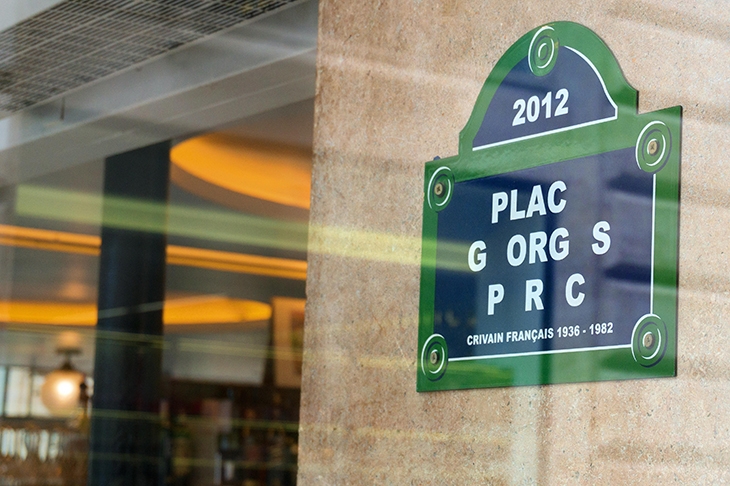Have you heard of the Oulipo? The long-running Parisian workshop for experimental writing? Even if you haven’t, you might have heard of some of its members: Georges Perec, Italo Calvino, Marcel Duchamp. The group’s stock-in-trade (so-called ‘constrained writing’) is best illustrated by their most notorious production: Perec’s 1969 novel La Disparition which manages to avoid using the letter ‘e’ (and which was miraculously translated into English as A Void).
Founded in 1960, the Oulipo spent its first decade in self-imposed semi-secrecy. While its academic sibling, Structuralism, came to dominate literature departments both at home and abroad, the Oulipo watched discreetly in disdain: why are the structuralists so dry, so up themselves? Where’s the fun in that? In the mid-1960s, when the group’s original joie de vivre began to flag, a decision was taken to revivify things by accepting new members, and these second-wavers — many of whom, such as Perec, Jacques Roubaud and Harry Mathews, were up-and-coming writers with something of a public profile already — made secrecy more or less untenable.
The group has continued, periodically, to take on new blood, and are more active and less secret than they’ve ever been. For nearly 60 years they have held monthly meetings in Paris to discuss new constraints and new literary forms, ways of forcing writers out of their familiar patterns, of making them say things they didn’t expect to say.
If that all sounds a bit surrealist to you, then you’re both right and wrong. A number of the group’s founder members had been through surrealism’s fractious, bitter first wave and come out the other end jaded and sceptical. What literature needed was not more freedom but less; not chance, but rules. Look at literary form, they would say, whether rhyme, metre or the Aristotelian unities of drama: great literature, from its earliest days, has always had some kind of scaffolding propping it up. Free verse, barely a century old, is a mere babe-in-arms, and quite possibly a flash in the pan. What is it about the sonnet form — a deeply restrictive combination of constraints: line count, metre, rhyme, the volta, or conceptual turn towards the end — that has made it such a fertile bed for a certain type of expression or a certain sized thought? What would happen if we tried other types of restriction, maybe ramping things up a little? How would that focus the expression? What are the characteristics it would bring out?
And so, among the hundreds of techniques the group has experimented with, we find ‘homophonic translation’, in which you translate the sounds rather than the sense of a text (as in the ‘Un petit d’un petit’/‘Humpty Dumpty’ poems of Louis van Rooten); there is ‘N+7’ where you take a pre-existing text and replace every noun with the seventh one following it in the dictionary (‘Shall I compare thee to a sunbather’s deadbeat?’); and, of course, the lipogram, where you avoid using certain letters.
Sometimes Oulipians have produced major works from ideas bashed out at the group’s meetings — Perec’s Life, A User’s Manual; Italo Calvino’s If on a Winter’s Night a Traveller — but the group is not a writers’ group in the usual sense. Rather, it is a laboratory, inventing, testing and unleashing new forms for consideration in the wider literary world. By no means all of its members have been literary figures themselves.
Which brings us to All That is Evident is Suspect, the new anthology edited by two of the group’s members, Ian Monk and Daniel Levin Becker. One of the constraints at work in this volume is that all of the Oulipo’s 41 members — writers and non-writers — are represented. This has taken some creativity, since, for example, Duchamp’s involvement was limited to attending a lunch on a flying visit to Paris. The collection reproduces his sparse notes to the group, not quite apologising for his habitual absence. Another perennial absentee, Stanley Chapman, is represented with a gloriously cantankerous letter bemoaning the whole Oulipian enterprise as tedious and overrated.
Most of the material here, however, is straightforwardly literary. Some is playful — an extract from a novel composed entirely of prefaces; a musing on books with numbers in their titles — but much of it is serious, moving and deeply intelligent. Constrained writing, we find, is not intrinsically whimsical, even if that is very often our first response to it.
For a couple of decades, readers who are curious about the Oulipo but don’t have French have been well-served by the wonderful, but difficult to get hold of, Oulipo Compendium from Atlas Press. Its last edition, however, was in 2005. All That is Evident is Suspect, which skews heavily towards more recent writings, is an excellent way to catch up with this strange, funny and important wing of the literary avant-garde.






Comments